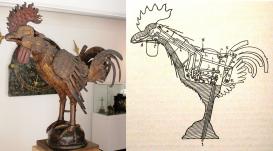This project is part of a PhD thesis that focuses on automata imagined and made during the Western Middle Ages. Based on the works of my predecessors Chapuis, Ambrosetti, and Truitt, my study focuses on various sources (narrative literature, technical literature, archaeological realia) in order to understand the place, the role, and the development of automata in medieval society. In particular at the MPIWG, this study focuses on the transmission of knowledge in applied mechanics between the Eastern and Western world. Indeed, whereas the fabrication of automata roots in antiquity in the fourth century BC in the Museum of Alexandria, and mechanical knowledge was transmitted and expanded in the East during the Middle Ages, in the West, not until the end of the thirteenth century the emergence of the mechanical clock initiates a tradition of making automata. In the preceding centuries, however, the automata known in the Occident were diplomatic gifts by the Arabs, or testimonies, travel accounts, as we know from French novels. Therefore, the invention of the mechanical clock is a pivotal moment, indicating the transition of the automaton from a fantasized and wonderful object into a mechanical and technical reality. My research objectives are to determine if the way to describe mechanisms in texts or the way to understand the first fabrication of automata are inspired by a transmission of Greek and Arab knowledge, but also to see if the discourse and the lexicon describing the automata in narrative literature changes when they are effectively fabricated in the Occident.

Rooster automaton of the first astronomical clock of the Strasbourg's Cathedral (Palais de Rouen - photograph by V.Deluz) and drawing of the mechanical system by Ungerer (1922).
Project
(2017-2018)
Between Marvel and Machine: The Automaton in the Middle Ages
Note
- Vincent Deluz
- Cooperation Partners:
- Zeno Karl Schindler Foundation (Geneva)
- University of Geneva
